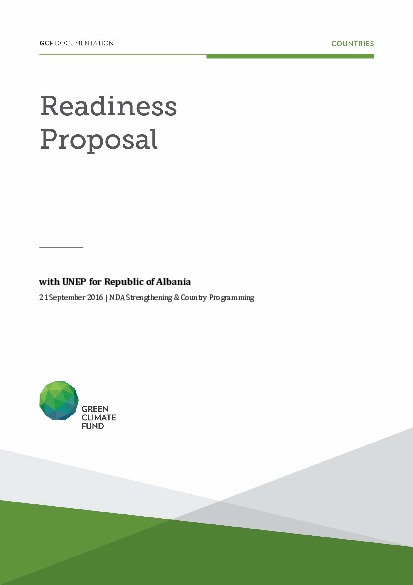NDA Strengthening and Country Programming support for Albania through UNEP

NDA Strengthening and Country Programming support for Albania through UNEP
Albania is considered the most vulnerable country in the South East Europe region to changing climate trends. Changing weather patterns have already been observed over the last 15 years with increasing temperatures, decreasing precipitation, and more frequent extreme events like floods and droughts. Projections indicate a decline in summer rainfalls of about 10 percent by 2020 and 20 percent by 2050. Two sectors that are acutely impacted by these shifts in climate are energy and agriculture. Climate change is expected to have considerable consequences for the livelihood of the citizens of the Republic of Albania. During the past ten years, floods have turned into a constant phenomenon in both the South and the North of the country, areas with the highest agricultural productivity. These severe consequences of climate change that threaten the environment of the Republic of Albania and the livelihoods of its citizens have resulted in a stronger political will to tackle climate change and climate change related issues. The Intended Nationally Determined Contribution (INDC) of Albania committed to reduce CO2 emissions by 11.5 % by year 2030.
The impacts of climate change, vulnerability of Republic of Albania’s key most affected sectors and measures for adaptation to climate change have been articulated in the Second and updated in the draft Third National Communication to the UNFCCC, to be submitted in 2016. The National Adaptation Plan (NAP) will also be part of this report. Furthermore, the Republic of Albania during 2015 has developed two draft NAMA projects:
- NAMA for the implementation of the National Action Plan for Energy Efficiency
- NAMA for the application of alternative fuel in cement factories, replacing solid fuels not dangerous waste
Further related projects and initiatives include:
- Market transformation and strengthening of the initiative on the use of solar panels for hot water in Albania,
- Carbon Reduction in South East Europe LOCSEE, aiming at strengthening the national capacity of the development of strategies with low carbon, in line it with the requirements expected of EU membership,
- Project of Kune‐Vain for adaptation to climate change, which aims at adapting the Lagoon Kune Vain based Ecosystem through concrete interventions in the lagoon.
Ministry of Environment is also a main beneficiary institution of ECRAN (Environment and Climate Regional Accession Network) project that aims to strengthen regional cooperation among EU candidate countries and potential candidates in the fields of environment and climate change.
The activities envisaged in this proposal do not overlap with any existing readiness support offered by other entities and will build upon the completed and ongoing adaptation and mitigation activities outlined above. Particular attention will be paid throughout the whole process not to replicate previous efforts but to use the funds in the most effective manner, identifying unaddressed needs through a broadly consultative process. Specifically, the adoption of a Country programme and its continuous updating is expected to provide an efficient and constantly up to date prioritization allowing for the best use of resources helping Albania to deliver its INDC and relevant strategies.